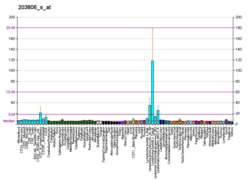Fanconi anaemia, complementation group A, also known as FAA, FACA and FANCA, is a protein which in humans is encoded by the FANCA gene.[5] It belongs to the Fanconi anaemia complementation group (FANC) family of genes of which 12 complementation groups are currently recognized and is hypothesised to operate as a post-replication repair or a cell cycle checkpoint. FANCA proteins are involved in inter-strand DNA cross-link repair and in the maintenance of normal chromosome stability that regulates the differentiation of haematopoietic stem cells into mature blood cells.[6]
Mutations involving the FANCA gene are associated with many somatic and congenital defects, primarily involving phenotypic variations of Fanconi anaemia, aplastic anaemia, and forms of cancer such as squamous cell carcinoma and acute myeloid leukaemia.[7]
- ^ a b c GRCh38: Ensembl release 89: ENSG00000187741 – Ensembl, May 2017
- ^ a b c GRCm38: Ensembl release 89: ENSMUSG00000032815 – Ensembl, May 2017
- ^ "Human PubMed Reference:". National Center for Biotechnology Information, U.S. National Library of Medicine.
- ^ "Mouse PubMed Reference:". National Center for Biotechnology Information, U.S. National Library of Medicine.
- ^ "Entrez Gene: FANCA Fanconi anemia, complementation group A".
- ^ Dokal I (2006). "Fanconi's anaemia and related bone marrow failure syndromes". Br. Med. Bull. 77–78: 37–53. doi:10.1093/bmb/ldl007. PMID 16968690.
- ^ Tischkowitz MD, Hodgson SV (January 2003). "Fanconi anaemia". J. Med. Genet. 40 (1): 1–10. doi:10.1136/jmg.40.1.1. PMC 1735271. PMID 12525534.





